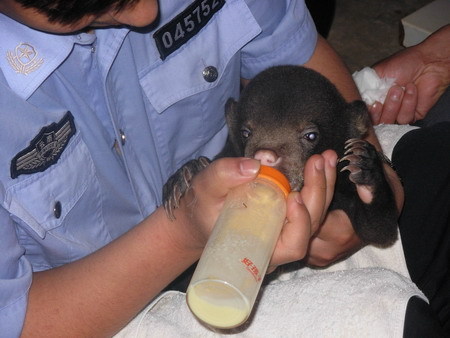China is to step up training in wildlife protection to counter the booming illegal trade in endangered species. A team of experts in environmental law is developing a training course on China's Animal Protection Law. The course will the first of its kind in China, the Legal Daily reports.
Led by Chang Jiwen, director of the Institute of Social Sciences Law in the Chinese Academy of Social Sciences, the team comprises famous Chinese zoologists and environmentalists from Tsinghua University, Wuhan University and China University of Political Science and Law.
The course will elaborate on the theories of animal welfare law and introduce related foreign legislation. Chang said wildlife protection had become a hot social topic drawing nationwide attention.
It would also include the welfare of animals in farms. During the global financial crisis, the protection of animal welfare can greatly promote the country's export of farm animals, Chang said.
"Neglecting the welfare of farm animals inevitably will result in the decrease of their immunity to disease and lead to outbreaks of public health problems like swine flu and bird flu," Chang said. "The neglect will also lead to moral and religious problems."
The course will be published in 2010.
Animal smuggling still rampant in border areas
Six little bears moved into the Yunnan Wildlife Asylum Center in Kunming, Yunnan Province in May after they were rescued by anti-smuggling police, according to Xinhua.
 |
|
A police officer feeds a sun bear in Kunming, Yunnan Province, on May 14, 2009. Six little bears were moved into the Yunnan Wildlife Asylum Center in Kunming on Thursday, after they were rescued by anti-smuggling police. [Xinhua]
|
The Yunnan Forest Public Security Bureau at Daluo Town, Xishuangbanna, which borders Myanmar, found the six bears as they were being transported over the border. The six bears included one sun bear, which is under state first-class protection, and five black bears under state second-class protection. The sun bear, only one month old, was slightly injured.
Li Honguang, one of the smugglers, said that they were going to sell the bears to circus troupes in Anhui and Guangdong provinces.
On April 25, Yunnan Customs also confiscated 190 Burmese peacock turtles and 59 flap-shell turtles in the Ruili area.
Zoologists said animal smuggling is exceeded only by that of drugs and arms in the world. The global wild animal and plant smuggling trade volume is estimated to reach US$50 billion annually. Because of an increasing domestic market and limited resources, border trade has introduced wild animals and plants into China over the past years. The illegal trade poses a big threat to biodiversity protection and sustainable development in the region.
Yunnan police, customs and forestry authorities have worked together to solve a series of smuggling cases of wild animals over the past years, preventing economic losses estimated at 7 billion yuan (US$1.23 billion). The confiscated wild animals include Yunnan golden monkeys, white-faced gibbons, pangolins, monitors, Asian elephants and Asiatic black bears. All are under state-level protection.